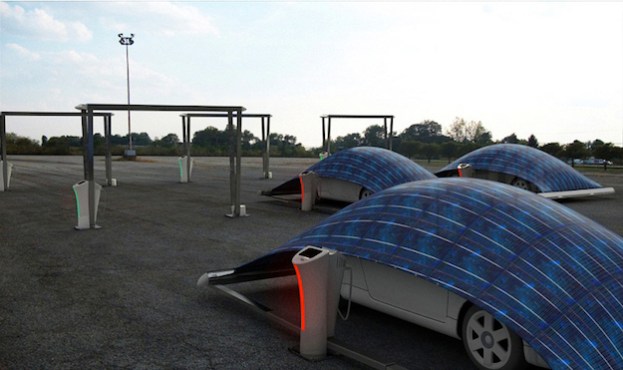A story caught our eye from designboom (via Green Car Reports) about a clever EV charging station from a designer named Haken Gursu of DesignNobis, a creative design firm based in Turkey. Gursu has rendered a rather simple yet ingenious bit of EV charging tech called the “V-Tent.”
The V-Tent is a solar panel canopy that extends over EVs while parked, providing both protection from the elements and also solar power for recharge.
We absolutely love this idea. We’re less interested in its protective properties – designboom suggests the tents could deter theft as they create barriers when unfolded – and more in its power-harnessing potential. One of the big issues with EVs is power generation. While coal-fired power plants (which provide more than 50-percent of US electricity) are inherently more efficient than gasoline engines, they still pollute. EVs could recharge – albeit slowly – off of the sun rather than off the coal-fired grid.
The paid-by-card charging stations would allow for smartphone connectivity through an app, which would give users charge-time estimates. It’s not clear how long a charge would take. Right now, a full recharge would most likely take days. Solar panel technology, however, is rapidly improving so the viability of a solar charge canopy like this could be greatly improved in several years.
With concerns over the long-term practicality of EVs as a mainstream replacement for gasoline-powered vehicles, it’s creative designs like this that could be a boon to EVs. Watch an animation of the tents in action here.
Editors' Recommendations
- Best electric car charger deals: $100 off home charging stations
- Apple talks with Hyundai and Kia about electric vehicle are reportedly ‘paused’
- Hummer will return as a 1,000-horsepower electric vehicle in Super Bowl ad
- Nissan teams up with EVgo to provide free charging of Leaf vehicles in U.S.
- Tesla begins rolling out its fast-charging V3 Superchargers



